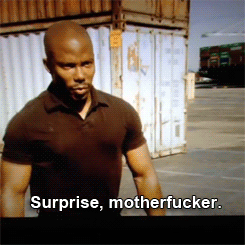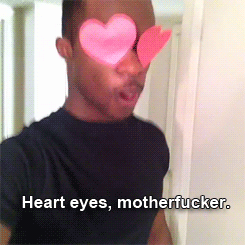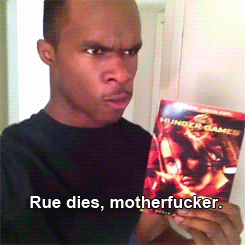We Got Peak Lore Right Here Guys
We got peak lore right here guys
Yeah, but the gun can just use one bullet/blade, then the blade needs to be picked up, manually loaded and shot again.
Can he use a gun??
the narrator is a pacifist and installed a chip in tlq's brain to make him incapable of using a gun
More Posts from Aimar01 and Others
This análisis is AMAZING
Also
ANOTHER STRANGE BEGINNINGS LOVER YAAAAAY!!!!!!!!
So I've been thinking quite a lot about the Princess as a character lately (more than usual I mean), and how there's something about her that feels so… real to me? Which maybe is a bit counter-intuitive at first, considering how she changes.
Usually when one thinks of a "well-written" character, one of the main qualities they'd think of is consistent characterization. But the Princess, by design, has a drastically different characterization in every route. At times the different vessels can feel like entirely different people! So if she changes so much, what even is her character? Who is the Princess?
It's a question that is asked by the game itself in a few places. The Shifting Mound yearns to understand herself, exploring the depths of her being with every vessel. The Stranger, which in many ways is a metacommentary for the game in general, examines this question by showing the Princess without any preexisting relationship or external influence. And yet, there's so many possibilities of who she could be that it's impossible to connect with, or even know any of them (at least in that moment). Attempting to follow the center staircase, vainly seeking the "true" path leads to a Princess more blank-seeming than ever. By the end of the chapter, they have no idea who or what they are.

The beating heart of this story is in the relationship between you and the Princess. It relies on her being someone that you care about by the end of the game. But how do you form a connection with her when every Princess is so different?
Well, there's a few reasons, but I'd argue that the vessels aren't nearly as different as they initially appear. There are many common patterns that appear across most of them: "familiarities that bind everything together".
For example, her motivations are actually very consistent:
She wants freedom
She wants connection
She wants to understand herself
I'm gonna break each of these down:
She wants freedom - from her chains, from the cabin, from the construct, from the restrictive roles assigned to her.
This can be seen throughout the whole game. The initial choice presented to you in Chapter 1 is to slay her or free her. In most chapters, her most immediate desire is to escape whatever is chaining her down, and multiple endings of the game involve her achieving this freedom (leaving the construct with Shifty, and leaving the cabin with the Princess in Unknown Together).
When bearing her heart to you, Nightmare screams at you to Let Her Out. Cage describes leaving as "all [she's] ever wanted".
If you directly contradict this desire in the Damsel by asking her to stay in the cabin with you, it's deeply distressing for her. Even though she agrees to do it, she's visibly uncomfortable with the situation. Notably, she actively contradicts your perception of her here, not reacting how you (or Smitten) expected her to. If her desires were completely malleable, she would conform to your expectations, but this desire is so strong that it can reverse the effects of deconstruction, seemingly convincing you that she isn't just a cardboard cutout of a person.
The only vessels that seemingly lack this desire for freedom are Adversary (+ her Chapter 3s), Razor, and the Greys to some extent. In all of these cases, they substitute the desire for freedom with the previously stated desire for connection with you (which she achieves through eternal combat, or the externalization of burning passion/suppressed emotion). Even then, Eye of the Needle describes leaving as "a fundamental truth [she'd] somehow forgotten" after leading her out. Even when this desire is repressed, it still seems to exist deep down, and can be brought to the surface in the right circumstances.
2. She wants connection and understanding - particularly with you. This is sometimes a more subconscious desire, but you see it in many vessels. Adversary feels connected to you through eternal combat. Fury places the weight of her agony on you in hopes of being understood. Thorn yearns for connections she feels she doesn't deserve. Wild experiences being connected with you and knows that this is what you're meant to be. Spectre wants you to understand her, which is part of why she's so content in P&tD despite the murder-suicide leading to it: you get so experience being her, and she isn't alone anymore. I could really go on.
This motivation draws from a few places, I think. On a subconscious level, she recognizes that you & she used to be a single being: the cycle of life and death itself. At the very least, she recognizes a feeling of emptiness when she's separated from you.
![Screenshot from the Adversary. She says "Is there more to life [than fighting each other forever]? When you're not here I feel empty and alone. When we're not fighting I feel… stuck. Like there's something important I'm supposed to be doing. Like I'm being shoved into a space where I don't fit."](https://64.media.tumblr.com/c90199418a1c7930bd6642db3269e620/cd7a86792d4fcd16-b0/s500x750/8a8fce95590b71463b74cbce062580e8b8f50514.jpg)
It also draws from how the construct isolates her. She's deeply lonely, trapped in the basement for who knows how long before you arrive. While you have the Narrator and voices with you from the beginning, she only has the cabin for company… which treats her like this:


As an extension of this, she's terrified of being alone. There's a reason why the Nightmare's sorrow is born from leaving her in the basement, why loneliness is a major theme of when she removes her mask, why trying to kill the Spectre leaves her grimly disappointed but abandoning her makes her completely spiral, why leaving the Princess behind in P&tD, Den, and Thorn are consistently the least satisfying outcomes to their chapters, why turning and leaving in Chapters 2 & 3 is such an inherently destructive act.
3. She wants to understand herself - the Shifting Mound is an explicit example of this, though you can see it in the vessels too.

Understanding herself and understanding you are inherently intertwined in Shifty's eyes, which is also reflected in the gameplay. You show her new sides of herself by making new choices, perceiving her in new ways, and giving her new experiences. In turn, she shows you parts of yourself by reflecting your perception back at you. If you've been on the STP Reddit recently you've probably seen loads of posts where people share their first playthrough and ask what it says about them. In a way the game becomes your mirror, helping you to better understand yourself in parallel with Shifty.
Self-understanding is also a recurring theme in STP in general (this post by @sharoo breaks it down very well). TLQ starts the game knowing nothing about himself, and is implicitly assumed to be a person, but throughout the game you slowly realize it's much more complicated than that.
Meanwhile, the Princess has been a prisoner for as long as she can remember, kept in complete isolation, with no autonomy: far from the ideal conditions to develop a sense of self. When you talk with her in Chapter 1, she struggles to answer even basic questions about herself. While a first-time player might assume this is due to her hiding things from you, she genuinely doesn't have answers to these questions. She doesn't tell you her name because she never had one.
And I think this is why many of the Chapter 2 vessels cling so tightly to whatever sense of identity you've established through Ch1's events (Nightmare's repeated line of "I am what I am", Beast's "There's no reasoning with what I am", Tower's "This isn't about desire. This is about what I am", etc.) They decide "what they are" based on the very limited experiences of Chapter 1, because that's all they have to go off of. (Adversary's "best 3 minutes of my life" line, while funny, is very sad to me in this context, considering the rest of her life within memory was spent chained to a wall with only a cabin who hates her for company)
Because the Chapter 3s usually involve a shift in your dynamic with the Princess, it also often involves her identity being disrupted in some way, forcing her to question or reevaluate herself (Skeptic!Eye of the Needle is confronted with freedom and can't reconcile it with her desire for violence, both Furies lose something essential to their sense of self and take it out on you, Empty Cup doesn't know how to define herself outside of being "the one who hurts you", Wild is fused with you and tries to redefine herself in contrast to the hatred/terror of the previous chapter, Cage comes to understand herself as being a powerless observer, and so on)
And then there's the Stranger, who never had the chance to build a relationship with you in Ch2, and couldn't build an identity around that role.
At the end of everything, we see her try to reconcile all these parts of herself. Shifty encompasses all of it at once, reaching divine enlightenment at the cost of losing touch with her sense of personhood. The Heart Princess meanwhile, is specifically the first Princess you met, although she's shaped by the experiences of the others. The Sharp Heart Princess describes herself as being "more" than she was before, having experienced and grown so much, and getting to know herself through all of it.
Meanwhile, Strange Beginnings has the Stranger develop a sense of identity compared to their Ch2, though they're still being pulled in different directions. While they still might not understand the full depths of their being, they take great joy in discovering new things in each other with you. It's a lot like the Unknown Together ending itself: not knowing what you'll find is what gives it meaning, and what really matters is that you're doing this together.

(I just really love Strange Beginnings in general…)
Beyond the Princess' motivations, I think it's also worth talking about her personality, because as much as she struggles to define it for herself, there's actually quite a few similarities across the vessels.
While these traits aren't all 100% consistent, the few times these patterns are broken can also tell us something about the Princess by showing what it takes for those personality traits to bend and snap, and how that change affects her.
One trait that stands out to me is that she’s generally very honest. She tends to state her intentions and desires very directly, both in Chapter 1 and in subsequent chapters. She's also comically terrible at lying about said intentions in the Razor's case lol. It makes sense too, since she has so little to hide in the first place. She stands in contrast to the Narrator, who insists that she's spinning a web of lies while being incredibly secretive and manipulative Himself. In response to His "she will lie, she will cheat" spiel in Chapter 2, many of the voices talk about how honest she was.
The only major exception to this honesty is the Witch, who notably only appears when her trust has been broken in Chapter 1: when you show her that her honesty is rewarded with a (literal and/or metaphorical) knife in the back. Even then, she's actually very honest with you about what happened after you died, her desire to leave, and her distaste for you lmao
Also from how she talks about not being able to help herself, and how much she genuinely did want freedom, her betrayals read more to me like impulsive decisions that she indulges out of spite than premeditated plots, which she rationalizes to herself as being in her nature (even though you are capable of breaking out of it, as shown in Thorn and Wild).
Additionally, this role of scheming liar the Witch declares for herself is one that makes her miserable. It keeps her from the things she really wants (freedom and connection), literally slamming the door on her own desires. It doesn't do her self-image any favours either:

Another trait prominent in Chapter 1 is her pragmatism. She's willing to cut her arm, resort to violence, fight dirty, put her head down and bear whatever suffering is necessary to get what she wants. Even softer princesses like the Damsel show this pragmatism: her behaviour could be read as a people pleasing response. You were the only one who tried to help her in Chapter 1, so if she keeps being nice to you, if she can make you happy, then you'll be able to help free her for good.
She's also incredibly bold & brave, facing her fears head-on while rarely letting those fears show. I mean, there's plenty of horrifying things that can happen to you both, but the times she's visibly afraid are few and far between (fighting Adversary unarmed, abandoning Spectre, showing your heart to Damsel). There's also the knowledge of what TLQ looks like from her perspective. She describes him as scary and hard to look at, but throughout every chapter she's willing to engage and interact with him, and in many cases even fighting him directly, and winning!!
I think it's in part a way of exerting control in a cruel situation that limits her control. And considering how her abilities change based on perception, outwardly projecting enough strength could actually be enough to give her that strength, so it's a trait that can end up reinforcing itself, like in Tower/Apotheosis.

She's also very perceptive: often noticing elements of how the construct works before TLQ does. Many vessels understand that you have to leave the cabin together by the start of Chapter 2. Prisoner knows to avoid the Narrator's attention, and that she could survive cutting her head off. Spectre understands that there's somewhere else she's supposed to be. Vessels like Burned Grey and HEA recognize that the cabin itself is keeping you small.
She seems very aware of how you perceive her as well, likely in part because of how she's affected by your perception. Even if she doesn't know her true nature, she would still notice herself changing and could link those changes to you. There's this extremely self-aware line in P&tD where she says "It's like 'you' don't really know what we're supposed to be", implies an intuitive understanding of how this all works.
There's a sense of playfulness to a lot of the vessels. From Spectre circling and teasing you, P&tD's casual quips and jokes, Nightmare's toying with you, Stranger's "Who are you calling weird?", Razor's everything. Even more serious vessels have moments of silliness, like Prisoner joking that the empty shackle might fit you, or Cage's head jokes. Some of this could be attributed to the humour in STP's writing style, but I also think it's just part of who she is. I mean, if we can characterize LQ as a big ol' goober based on some of his sillier dialogue options, then I think we can do the same for the Princess and all her silliness. Also, Clown Princess.
She has a strong preference for action over words - this is something emphasized about TSM but also appears in various princesses (Adversary/Fury, Beast, Den, Prisoner, Chapter 1 Princess' silent squinting contest). Thorn sees words as hollow, and finds meaning and truth in action. If P&tD is anything to go by, she's also generally willing to sit in silence for long stretches of time waiting for you to reply. It's an interesting contrast to the Narrator, who only has words to convince you.

She also seems struggle to communicate with words at times. Shifty finds words difficult because they can't capture the whole of what she wishes to say, and finds verbal descriptors of her name incapable of describing the depths of her being. And even beyond Shifty, the Soft Heart Princess will say that she prefers not having a name. She seems to have more success expressing herself through non-verbal forms of communication.


And in the face of it all, she's a very hopeful character. She has hope that she'll escape, that she can make amends with you, that things will turn out okay in the end, the hope that whatever choices you make will be the right choices. This hope is often what keeps her moving even in the most grim circumstances. Even chapters like the Wraith, where she's (justifiably) given up hope with you, she's still as driven as ever for her freedom. The chapters where she loses that hope entirely are some of the heaviest imo (Cage, Fury, even HEA), and all of these routes involve some sort of separation from her own identity & desires, showing how important that hope was to her sense of self.
Even though I've just listed a bunch of fairly consistent traits, that doesn't mean I think the vessels are all the same: far from it. Although these vessels have a shared starting point, from the first new choice each one has a different narrative, causing them to grow in wildly different directions.
Any one of the Princess' personality traits are theoretically malleable under the right circumstances, but... isn't the same true of us?
Across every hypothetical permutation of your life's story, every possible version of you, is there any one personality trait that you could guarantee was constant across all of them? If you had different formative experiences, different traumas, different relationships, a different community with a different culture and different values and paradigms, would you even be recognizable, let alone similar?

It makes me think of the field of epigenetics: even innate genes are expressed differently based on external environment and experiences. It's one possible response to the long-standing debate of nature vs. nurture. Your nature is set, but how it is expressed varies drastically based on your nurture.
(I've talked about this a bit before but I think STP would be interesting to view through the lens of nature vs. nurture, with its common adage of "it's in your/her nature", the way you & the Princess change based on your experiences, and how you can choose to break out of roles you were created to fill, but I've already rambled more than enough in this post aha)
The Princess, in all her multitudes, brings out the extremes of nurture. The ways she changes depending on her experiences are a reflection of how people change and develop differently depending on their life experiences. Even as she changes based on your perception, she also changes on her own, even in ways that surprise you.

There is no singular version of the Princess, like there is no singular version of any of us. She's growing and changing with every new experience in complicated and contradictory ways, just like we do.
And I think that's why she feels so real to me, why the game overwhelmingly succeeds in getting players to connect with her. Perhaps it makes her an unconventional character, but to me, it makes her much more like a person.

they will be dealt with










Thank you Princess

She deserves her own wings, god I need a bird Princess wait hold on I CAN MAKE ONE




What people think enemies to lovers smitten looks like:
Smitten x thorn
What It would actually look like:
Smitten x narrator

This vessel is too full of you.
I need an empty vessel.
-
 dogbound1128 liked this · 4 days ago
dogbound1128 liked this · 4 days ago -
 moon-in-orbit liked this · 1 week ago
moon-in-orbit liked this · 1 week ago -
 moon-in-orbit reblogged this · 1 week ago
moon-in-orbit reblogged this · 1 week ago -
 lewstherintelescope liked this · 1 week ago
lewstherintelescope liked this · 1 week ago -
 as-the-jay-flies liked this · 3 weeks ago
as-the-jay-flies liked this · 3 weeks ago -
 arcane-darkling liked this · 1 month ago
arcane-darkling liked this · 1 month ago -
 edge-of-nowhere liked this · 1 month ago
edge-of-nowhere liked this · 1 month ago -
 hoo-nix liked this · 1 month ago
hoo-nix liked this · 1 month ago -
 agoblinment liked this · 1 month ago
agoblinment liked this · 1 month ago -
 terminallydumb liked this · 2 months ago
terminallydumb liked this · 2 months ago -
 wizb1z liked this · 2 months ago
wizb1z liked this · 2 months ago -
 mr-pages-things liked this · 2 months ago
mr-pages-things liked this · 2 months ago -
 squidsandthings reblogged this · 2 months ago
squidsandthings reblogged this · 2 months ago -
 boopshoops liked this · 2 months ago
boopshoops liked this · 2 months ago -
 sillyfull-jua reblogged this · 2 months ago
sillyfull-jua reblogged this · 2 months ago -
 sillyfull-jua liked this · 2 months ago
sillyfull-jua liked this · 2 months ago -
 ankledestroyer8000 liked this · 2 months ago
ankledestroyer8000 liked this · 2 months ago -
 redmangame liked this · 2 months ago
redmangame liked this · 2 months ago -
 cactusdying liked this · 2 months ago
cactusdying liked this · 2 months ago -
 goomythestrategist liked this · 2 months ago
goomythestrategist liked this · 2 months ago -
 buggy-moths liked this · 2 months ago
buggy-moths liked this · 2 months ago -
 waxwitch reblogged this · 2 months ago
waxwitch reblogged this · 2 months ago -
 awkward-amateur-artist liked this · 2 months ago
awkward-amateur-artist liked this · 2 months ago -
 irusanw4 reblogged this · 3 months ago
irusanw4 reblogged this · 3 months ago -
 little-red-phrygian liked this · 3 months ago
little-red-phrygian liked this · 3 months ago -
 beri-lola-186 liked this · 3 months ago
beri-lola-186 liked this · 3 months ago -
 chooseittehmemes12233 liked this · 3 months ago
chooseittehmemes12233 liked this · 3 months ago -
 fatiguedrodent liked this · 3 months ago
fatiguedrodent liked this · 3 months ago -
 banana-interface liked this · 3 months ago
banana-interface liked this · 3 months ago -
 trashsketch liked this · 3 months ago
trashsketch liked this · 3 months ago -
 fritootheend liked this · 3 months ago
fritootheend liked this · 3 months ago -
 takesohs liked this · 3 months ago
takesohs liked this · 3 months ago -
 imalloutofusernamesplsletmein liked this · 3 months ago
imalloutofusernamesplsletmein liked this · 3 months ago -
 fedexfed liked this · 3 months ago
fedexfed liked this · 3 months ago -
 icortherainwing liked this · 3 months ago
icortherainwing liked this · 3 months ago -
 bonybunny liked this · 3 months ago
bonybunny liked this · 3 months ago -
 ang33333333l liked this · 3 months ago
ang33333333l liked this · 3 months ago -
 mx-drumbot liked this · 3 months ago
mx-drumbot liked this · 3 months ago -
 cinnaminttt liked this · 3 months ago
cinnaminttt liked this · 3 months ago -
 purplehuman48 liked this · 3 months ago
purplehuman48 liked this · 3 months ago -
 not-quite-here-yet liked this · 3 months ago
not-quite-here-yet liked this · 3 months ago -
 spaicrab liked this · 3 months ago
spaicrab liked this · 3 months ago -
 oliveoilouvre liked this · 3 months ago
oliveoilouvre liked this · 3 months ago -
 solcoroleva liked this · 3 months ago
solcoroleva liked this · 3 months ago -
 magicianfrombelow liked this · 3 months ago
magicianfrombelow liked this · 3 months ago -
 too-many-beloveds liked this · 3 months ago
too-many-beloveds liked this · 3 months ago -
 tlq-asks liked this · 3 months ago
tlq-asks liked this · 3 months ago -
 decoy-sammy reblogged this · 3 months ago
decoy-sammy reblogged this · 3 months ago -
 decoy-sammy liked this · 3 months ago
decoy-sammy liked this · 3 months ago


